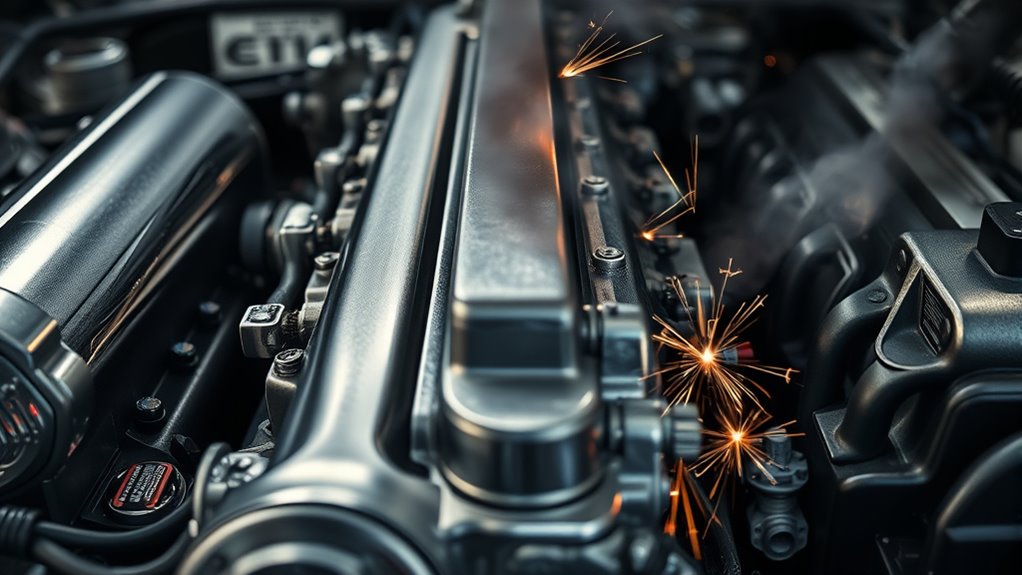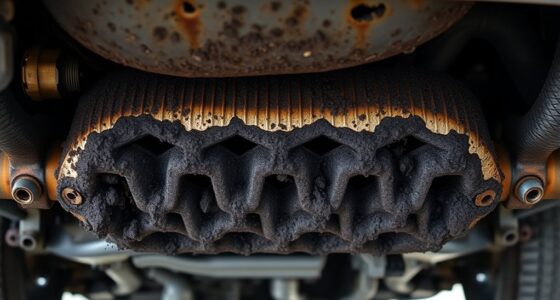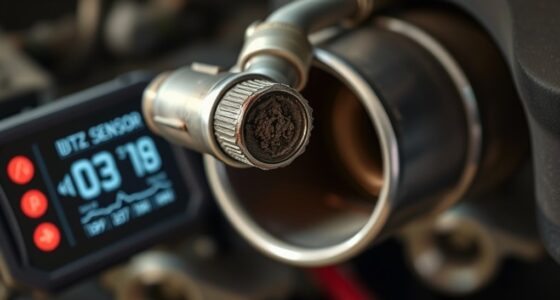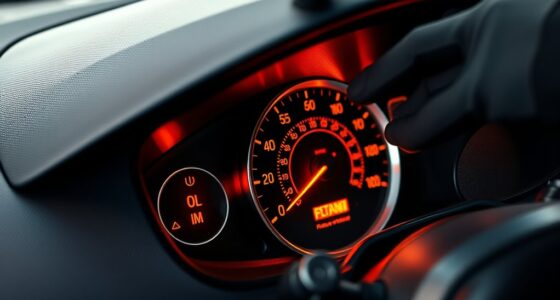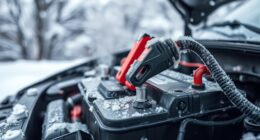A misfire at idle often stems from fuel delivery issues or ignition timing problems that affect smooth engine operation when the car is stationary or starting up. Under load, misfires usually happen because the engine faces higher demands, revealing issues like worn spark plugs, failing coils, or inadequate fuel supply. Knowing whether your misfire occurs at idle or under load helps identify if the problem is related to fuel, ignition, or both. Keep exploring to learn more about diagnosing and fixing these common issues.
Key Takeaways
- Idle misfires often result from fuel delivery issues or ignition timing problems at low engine speeds.
- Load misfires typically occur under high demand, such as acceleration, revealing fuel or ignition system failures.
- Diagnosing idle misfires focuses on fuel pressure, injector function, and spark quality when the engine is stationary.
- Load misfire diagnosis involves testing fuel system capacity and ignition components under stress conditions like hills or acceleration.
- Addressing misfires requires different approaches depending on whether they occur at idle or under load, targeting specific system components.

Understanding how your engine misfires at idle versus load is vital because the causes and solutions can differ markedly. When your engine stumbles or stalls while idling, it often points to issues that are more sensitive to precise fuel delivery and ignition timing adjustments. Conversely, if the misfire occurs under load—such as during acceleration or climbing hills—the root causes tend to involve different components or conditions. Recognizing these differences helps you diagnose and fix the problem more efficiently.
At idle, misfires often stem from inconsistent fuel delivery. Your engine relies on a steady flow of fuel to maintain smooth operation when there’s minimal demand. If your fuel injectors are clogged, your fuel pump isn’t delivering enough pressure, or there’s a dirty fuel filter, your engine may not get the right amount of fuel at the right time. This causes uneven combustion, leading to misfires that are most noticeable when the car is stationary or just starting to run. Additionally, ignition timing plays a pivotal role here. If the spark plug fires too early or too late because of a faulty ignition control module or a misaligned distributor, the engine’s firing cycle becomes unbalanced. This misfire can cause rough idling, stalling, or even a rough running engine at low speeds.
When you’re under load, the engine faces increased demands, and the causes of misfire can shift. Fuel delivery issues become more critical because the engine needs more fuel to generate power. A failing fuel pump or clogged injectors become more apparent because they can’t supply enough fuel during high demand, resulting in lean conditions that cause misfires. Ignition timing also becomes more critical under load. If the ignition system isn’t properly timed, the spark may occur too early or too late, preventing complete combustion. This not only causes misfires but also reduces power and efficiency. Other factors, such as worn spark plugs or ignition coils, are also more likely to cause misfires when the engine is working harder, as these components struggle to provide a strong spark under increased stress. Additionally, understanding the importance of proper maintenance practices can help prevent these issues from occurring in the first place.
To address misfire issues, start by inspecting your fuel delivery system—check fuel pressure, replace clogged filters, and ensure injectors are clean. Simultaneously, review your ignition timing and replace worn spark plugs or faulty coils if needed. Understanding whether the misfire occurs at idle or load helps you pinpoint whether the problem is fuel-related, ignition-related, or both. By focusing on these key areas, you can restore smooth operation, improve fuel efficiency, and prevent further damage to your engine.
Frequently Asked Questions
Can a Misfire Cause Long-Term Engine Damage?
Yes, a misfire can cause long-term engine damage if left unaddressed. It can lead to damaged pistons, valves, or spark plugs, increasing repair costs over time. Using diagnostic tools helps identify the root cause quickly, preventing further harm. Ignoring misfires risks costly repairs later, so it’s best to get it checked promptly to keep your engine running smoothly and avoid extensive damage.
How Do I Differentiate Between Fuel and Ignition Misfires?
You can differentiate between fuel and ignition misfires by observing engine behavior. Ignition misfires often cause sporadic stalls or jerks, linked to ignition timing issues or spark plug problems. Fuel misfires tend to produce rough running or hesitation, usually caused by an incorrect fuel mixture or clogged injectors. Use diagnostic tools or scan for error codes to pinpoint whether the issue stems from ignition timing or fuel mixture problems.
Are Certain Engine Types More Prone to Idle Misfires?
Surprisingly, some engine types are more prone to idle misfires, thanks to their design quirks. You’ll find that engines with complex or older designs often struggle more because of tighter manufacturing tolerances or intricate ignition systems. These quirks make idle misfires more common, even though you’d expect modern engines to handle everything smoothly. So, if you’re experiencing idle issues, consider your engine’s design and how precisely it was manufactured.
What Role Does Spark Plug Condition Play in Misfire Issues?
Your spark plug condition directly impacts misfire issues. Worn spark plugs with buildup or damage can cause weak sparks, leading to misfires, especially at idle or under load. An ignition coil that’s failing worsens this problem by not providing enough spark energy. Regularly inspect and replace worn spark plugs and test your ignition coil to maintain a strong, consistent spark, helping prevent misfires and ensuring smooth engine performance.
Can Environmental Factors Influence Misfire Severity at Different Loads?
Environmental factors definitely influence misfire severity at different loads. Poor air quality, with high pollution or dust, can clog your engine’s intake and affect combustion, worsening misfires. Altitude effects also play a role; at higher elevations, thinner air reduces oxygen, making your engine prone to misfires under load. You might notice more issues in these conditions, especially if your spark plugs or fuel system aren’t in top shape.
Conclusion
So, next time your engine decides to throw a tantrum at idle or load, just remember—it’s not trying to sabotage your day. Whether it misfires while sitting pretty or during a workout, it’s basically begging for attention. Ignore it, and you’ll be stuck playing mechanic roulette. Embrace the misfire drama; after all, nothing says “fun” like diagnosing a sneaky engine personality crisis. Happy driving—may your misfires be few and far between!
